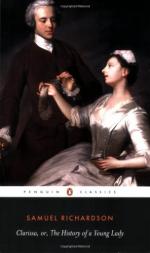I pass my time here at Watford, attending my dying uncle, very heavily. I cannot therefore, by any means, dispense with thy correspondence. And why shouldst thou punish me, for having more conscience and more remorse than thyself? Thou who never thoughtest either conscience or remorse an honour to thee. And I have, besides, a melancholy story to tell thee, in relation to Belton and his Thomasine; and which may afford a lesson to all the keeping-class.
I have a letter from each of our three companions in the time. They have all the wickedness that thou hast, but not the wit. Some new rogueries do two of them boast of, which, I think, if completed, deserve the gallows.
I am far from hating intrigue upon principle. But to have awkward fellows plot, and commit their plots to paper, destitute of the seasonings, of the acumen, which is thy talent, how extremely shocking must their letters be!—But do thou, Lovelace, whether thou art, or art not, determined upon thy measures with regard to the fine lady in thy power, enliven my heavy heart by thy communications; and thou wilt oblige
Thy melancholy friend,
J. Belford.
LETTER XXXVII
Mr. Lovelace, to John Belford,
Esq.
Friday night, may 19.
When I have opened my view to thee so amply as I have done in my former letters; and have told thee, that my principal design is but to bring virtue to a trial, that, if virtue, it need not be afraid of; and that the reward of it will be marriage (that is to say, if, after I have carried my point, I cannot prevail upon her to live with me the life of honour;* for that thou knowest is the wish of my heart); I am amazed at the repetition of thy wambling nonsense.
* See Vol. III. Letter XVIII.
I am of opinion with thee, that some time hence, when I am grown wiser, I shall conclude, that there is nothing but vanity, conceit, and nonsense, in my present wild schemes. But what is this saying, but that I must be first wiser?
I do not intend to let this matchless creature slide through my fingers.
Art thou able to say half the things in her praise, that I have said, and am continually saying or writing?
Her gloomy father cursed the sweet creature, because she put it out of his wicked power to compel her to have the man she hated. Thou knowest how little merit she has with me on this score.—And shall I not try the virtue I intended, upon full proof, to reward, because her father is a tyrant?—Why art thou thus eternally reflecting upon so excellent a woman, as if thou wert assured she would fail in the trial?—Nay, thou declarest, every time thou writest on the subject, that she will, that she must yield, entangled as she is: and yet makest her virtue the pretence of thy solicitude for her.
An instrument of the vile James Harlowe, dost thou call me?—O Jack! how could I curse thee!—I am instrument of that brother! of that sister! But mark the end—and thou shalt see what will become of that brother, and of that sister!




